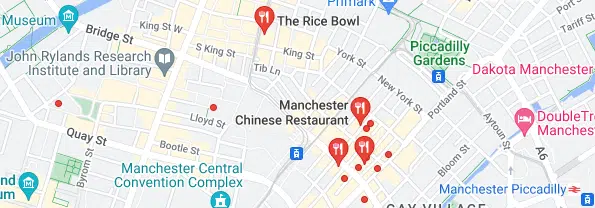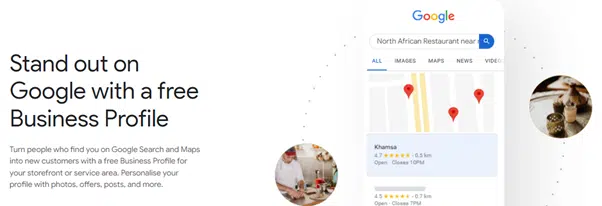It’s tough running a small business. Finances are tight, resources are limited, and you’re up against bigger, more experienced competitors. These points extend across all aspects of your company, including online marketing. However, there are ways to circumvent these issues and succeed with your promotional efforts.
One such way is local SEO.
With this guide, we’ll explain what local SEO is, the type of companies that benefit from it, why it’s crucial for your own small business, and much more.
What Is Local SEO?
If you’re familiar with SEO, aka search engine optimisation, you will have an idea about what the local variation involves. SEO is about improving the visibility of your website – and, by extension, business – across search engines. Well, local SEO takes the same concept but sticks to a specific geographic area.
For example, say you operate a gastropub in Manchester. Local SEO involves using strategies that are location-specific. This can revolve around targeting keywords such as “gastropubs in Manchester” and “best Manchester gastropub for food”. It also requires setting up and managing a Google Business Profile, as well as collecting positive customer reviews as social proof.
Regular SEO can often place an emphasis on attracting online customers due to a lack of geographic restrictions, where national or even international visitors are liable to come across content. Local SEO, on the other hand, is built around gaining attention from those in the area, where the endgame is often to get potential customers to visit a company’s physical location.
Where Local SEO Appears

(Screengrab: https://www.google.com/search?q=Chinese+restaurants+in+Manchester)
If you think local SEO is only about showing up in search results, the following information will change that viewpoint – fast. Local search results don’t only rock up on Google. Here is a list of where local SEO appears:
- Search engine results pages: Commonly abbreviated to SERPs, this is where your webpages organically appear within local-centric search results. Google is the main aim, obviously, but search engines like Bing and Yahoo also carry some worth. The bulk of your local SEO efforts will go towards climbing the SERPs in the hope of reaching page one for relevant search terms.
- Local Pack: Also known as the 3-Pack or Map Pack, the Local Pack is where you want to appear in Google search results. Why? The Local Pack takes up a prominent position, right at the top of the search results, where it displays three local businesses that relate to the search query made by a user. Along with the business name, this is accompanied by its position on Google Maps, ratings, operating hours, and other such details.
- Google Maps: If a person turns to Google and uses the Maps section to search for businesses near their location, it will result in local search results being displayed. This will show up relevant results with markers on the map to show its precise location. When a user clicks on a business listing for more information, it will present its address, operating hours, customer reviews, contact information, and more.
- Google Business Profile listings: It is usual for Google Business Profile information to appear when someone searches for a specific business. This can either appear in the aforementioned Google Maps section or Knowledge Panel and will include those reviews, business details, photos, etc. For a small business, they will likely have to create their own GBP before this information shows up.
- Local review sites and directories: Local directories, ranging from Yelp to Local Pages, are another way for a small business to be found by potential customers. Similarly, the likes of TripAdvisor, Trustpilot, and other review platforms can give users a way to explore businesses in their area.
- Social media channels: A number of social media channels can display local search results. With Facebook, for example, users have the ability to search for local companies, see what customers have to say via reviews, and even get in touch directly with businesses through their profiles.
Due to the number of ways local search results appear across the internet, it is essential you optimise with local SEO firmly in mind. The more effort you put in across the board, the greater the chance you’ll be seen by your target audience.

Why Is Local SEO Important for Small Businesses?
Going back to the subject in the headline of this very guide, let’s highlight exactly why local SEO is important for any small business targeting a local customer base.
Ultimately, there is one place that most customers turn to when learning about businesses, services, and products in their area: Google. Here are some local SEO statistics that back up this statement:
- 97% of users go online to discover more about a business than anywhere else.
- 46% of Google searches are done to find local information.
- 88% of mobile-based searches for local businesses result in a person visiting or calling a company within 24 hours.
Simply put, people are not reading their newspapers or watching television adverts to find out about businesses in their local area. They are taking a direct approach and using Google for the information. Oh, and here’s another juicy statistic that highlights the importance of refining your local SEO efforts: 92% of searchers won’t go beyond the first page of local search results.
That means if you’re not making an appearance at the top of those Google search results, you’re not going to generate any organic search traffic. It’s that simple.
Higher online visibility is essential for an increase in website traffic, generating leads, and making more sales. However, it’s not only about immediate results. With the right local SEO strategy, you are able to build brand awareness. It’s possible to prominently display your logo, business name, and information on a consistent basis, and this can lead to people subconsciously thinking about your company before they even make that Google search.
Beat the competition, increase your local audience, establish a presence within the community, and make more sales – those are the main reasons why local SEO is essential for your small business.

The Types of Businesses That Require Local SEO
Okay, local SEO is essential – but only for relevant business types. There are certain small outlets that, even if they’re just starting out, are looking beyond a local client base. This might be an online retailer that wants to ensure customers across the country – and possibly even abroad – are aware of their brand and wares.
However, if a business has a physical location or is serving customers in a particular geographic area, local SEO is a necessity. Here are some examples of small businesses that make use of this marketing tactic:
- Service-based companies: Companies that offer a specialist service within a specific area must use local SEO. Electricians, plumbers, builders, hairdressers, accountants, personal trainers – all of them need to build their online presence and gain traction against the competition. For example, if a personal trainer isn’t on the first page of search results, their competitors will be – and they’ll be hoovering up all the trade up for grabs.
- Restaurants: Have you ever searched for a certain cuisine or type of dining option in your local area? You’re not alone – virtually everyone has done this through Google at some point. When customers search for local dining options, they hope to find reviews, menus complete with prices, opening hours, and other business information. This is also applicable to bars, cafes, and takeaways.
- Retailers: Small shops and boutiques will use local SEO to build up their online presence. They can use this to not only educate people about their location and key store information but also to promote future events and promotions. This can be done through the likes of social media and posts via Google Business Profile.
- Medical services: Doctors, chiropractors, and dentists are just some of the healthcare providers who can connect with potential patients through local SEO. Along with supplying information such as services offered and hours of operation, local medical services can also offer the convenience of online appointment booking for their patients.
- Hotels: Yes, hotels and other forms of accommodation will benefit most from being listed on platforms such as Booking and Trivago. However, they can also profit from putting in the necessary effort with local SEO. If someone turns to Google as their first port of call when searching for accommodation, that can give a hotel the vital edge in getting their rooms booked.
- Local franchises: Even if they’re representing a national brand, franchisees can make use of local SEO. This allows them to differentiate from the rest, which assists with attracting customers that reside within their specific geographic area.
- Attractions and venues: Everything from amusement parks to theatres will use local SEO for their online visibility. For example, someone could make a relatively generic search like “entertainment near me”. When local SEO efforts are firing on all cylinders, these types of businesses can steal a march to become recognised as a leading entertainment destination in their area.
These are just a few examples. Essentially, any business type that has a physical location or provides area-based services can profit from a local SEO strategy.
How to Produce a Local SEO Strategy the Right Way

(Screengrab: https://www.google.com/intl/en_uk/business/)
You know the importance of a local SEO strategy. Now, there’s just one question: How do you go about actually creating one? The following step-by-step guide will go over the main points to incorporate when producing a local SEO plan the right way:
- Set goals: What are you ultimately hoping to achieve through your local SEO efforts? Increased online visibility? More foot traffic? A boost to sales figures? Outline these specific objectives before you proceed with your local SEO strategy.
- Local keyword research: You need local-themed keywords to succeed with local SEO. You can use a keyword research tool to find high-traffic keywords that are relevant to your business, its location, and products/services. Think of using keywords that directly include your geographic location. For example, if your business is based in London, use long-tail keywords that include the word London. This could be “budget friendly hairdressers in London”, “London hairdressers for curly hair”, etc.
- Optimise your website: Once you have a list of keywords, it’s about incorporating these the right way into your website. That means adding them directly into your content, meta tags, and so on. Of course, you want to ensure your content continues to flow seamlessly. The last thing you want is for keywords to stick out unnaturally – that won’t be appreciated by either your visitors or Google. The optimisation of your website should also involve creating a fast, easy-to-navigate hub that includes all relevant business information.
- Google Business Profile: Your Google Business Profile is another key aspect of a local SEO campaign. First, begin by either creating or claiming this profile. Once that’s done, it is all about fleshing out your GBP. Ensure all business details – such as location on Google Maps and operating hours – are accurate. You will then want to optimise the listing by including a short, effective business description, high-quality images, and regular posts about upcoming events, sales, updates, etc.
- Build your listings: Yes, GBP will cover the bulk of traffic as far as business listings go. However, getting your company spread across other local directories and review platforms is still a worthwhile endeavour. Aside from making sure nobody has any issue finding your business details, it also supplies your business with valuable backlinks – and that’s an important asset for any local SEO strategy.
- Build your backlinks: As mentioned in the previous step, backlinks are essential for improving the search authority of your website. Because of this, you should be taking all the necessary steps to build your backlink profile. This can be done with everything from guest blog posts to building relationships with local influencers. You can also naturally gain backlinks if you put effort into creating relevant, informative, and original content on your website.
- Gain customer reviews: Customer reviews are invaluable for any local business. The more positive reviews that are gained, the more social proof a company gains, and that can go a long way to securing new customers. Ensure to encourage customers to leave reviews, mentioning how much it would help your business. Additionally, it is also wise to respond to reviews – both good and bad – to demonstrate how committed your company is to customer satisfaction.
- Utilise social media: If you operate a business and have an online presence, social media should always be part of the strategy. Local SEO is no exception. From Facebook and Instagram to Twitter/X and TikTok, you can use social media to craft original, entertaining, and locally-relevant content. You also have the opportunity to actively engage with your community.
Monitor performance: Local SEO is not something you complete and leave alone. It is a strategy you have to work on continuously. This can be improved by regularly monitoring the performance of your campaign. By analysing your rankings in SERPs and using other key performance indicators, you gain valuable information to further improve and optimise your SEO strategy.
The Benefits of Local SEO
We’ve already touched on why local SEO is important for those in the small business world. Need further convincing? Well, let us break down the several benefits you can enjoy by reaching out to local customers.
Online visibility boost
It’s the most obvious point, but it’s also the most important. With local SEO, you are able to successfully enhance the visibility of your small business. Organic traffic cannot be overlooked or ignored. If you’re fortunate enough to secure a place on the first page of Google results or within the fabled Local Pack, this will result in a large increase of people seeing, discovering, and visiting your company.
Get to your target audience
There’s no point in advertising your business to people who have little to no interest in what you offer. This is why local SEO can be more effective than even the signage for a physical business. Think about this scenario. If a boxing gym is located in Newcastle, how many of the people walking past will have an interest in joining? The answer: not many. Yet when people are searching “boxing gyms in Newcastle”, that is precisely the gym’s target audience.
The result: a business can achieve a higher conversion rate and maximise their marketing budget in the process.
Enhanced brand reputation
A strong local SEO campaign has the ability to cultivate a stronger brand reputation. If people are seeing your business show up consistently within search results, this gives your brand not just visibility but also a level of credibility. That latter point is further enhanced when your brand is supplemented by a healthy collection of customer reviews.
Competitive edge
Even if you’re targeting a local audience, you’ll still be fighting it out against the competition. The smallest niches still face rivals – even if they’re direct or indirect. As a result, a high-performing local SEO campaign supplies your company with a significant competitive edge.
As your brand is the one that receives targeted local traffic, this also prevents the competition from getting that same traffic. The result: they’re not getting the valuable organic traffic that can make all the difference in terms of customer numbers and sales.
Increased foot traffic
Extending on from the previous point, it is proven that local SEO results in foot traffic. Once someone discovers your brand and likes what they see, it is likely they are going to pay a visit to your physical location. After all, it is only targeted traffic – aka those actively searching for your type of business – that will find your business through local SEO.
Cost-effective
When matched up against other marketing options, local SEO is generally one of the most cost-effective. Consider how much it would cost to advertise your business through traditional means like print ads and TV adverts. Yet it’s not just traditional avenues that are going to set you back more – there are other digital marketing tactics, including PPC ads, that are typically more expensive.
This is certainly the case if you measure it against your return on investment (ROI). With the right strategy, business owners are able to complete local SEO on their own. That means the only thing they’re spending is time.
Community engagement
Local SEO isn’t only about propping up your business through search ranking results. It is also a valuable strategy for actively engaging with your community. When you make use of social media and GBP posts, you are able to keep people updated about the latest events and happenings at your business. Not only that, but you are also able to directly communicate with your customer base.
These steps assist further with enhancing your brand and visibility, yes. However, they are also key to building long-lasting – and valuable – relationships for your business. After all, there’s nothing better than a repeat customer.
Enhance the user experience
That’s right: local SEO also has the capability of directly enhancing the user experience. This can be done with a mobile-friendly, easy-to-navigate website. Yet that’s not all. Simply having the correct business information on your external platforms can go a long way towards improving the user experience. If potential customers can seamlessly find your address and operating hours, this increases the chances of a conversion happening.
Valuable insights
As with other digital marketing strategies, one of the biggest benefits of local SEO is the amount of data you can extract and analyse. Trends, potential opportunities, areas to move on from – all of this type of information can be gained through analytics. With these valuable insights, you are able to refine your local SEO strategy for even better results.
Conclusion
If you operate a small business and target a local audience, you need local SEO – it’s that simple. This strategy is one of the most valuable for acquiring targeted, relevant traffic. Get your local SEO strategy right, and you can benefit from a large boost to visitor numbers, brand visibility, and sales numbers.
More Leads From Your Website
If you would like to start getting more enquiries and generating more sales from your website then click the button below to request your no obligation review and recommendations.

